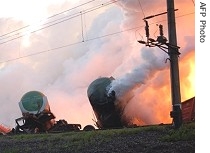2007年VOA标准英语-Ukrainian Officials Predict No Long-Term Conseq(在线收听)
Moscow
18 July 2007
Officials in Ukraine are assessing the damage of a train crash in western Ukraine that sent huge clouds of burning phosphorus billowing into the air. The accident, which took place Monday, is raising health concerns as far as Romania, Poland and Belarus. VOA Moscow correspondent Peter Fedynsky examines how far the phosphorus dispersed and to what extent it can damage the environment.
 |
| General view of the fire after the derailment of the train near Lviv, Ukraine, 16 July 2007 |
The press secretary of the Emergency Affairs Ministry in Belarus, Vitali Novitsky, says there are no signs of phosphorus contamination in that country.
The official says various agencies in Belarus are monitoring the environmental impact and are not aware of any negative changes in that country at this time.
The Ukrainian Emergency Affairs Ministry says tests have not revealed any dangerous concentrations of phosphorus in populated areas near the crash site. However, the ministry notes that the concentration of phosphorus oxides in the air in the immediate vicinity is up to three times the allowable limit. Nonetheless, the Emergency Affairs Ministry says people traveling through the region by car or train need not be concerned.
Yuri Ostapenko, head of the toxicology department in Russia's Agency of Social Development and Health, says phosphorus does not cause long-term pollution of water, soil and food supplies.
Ostapenko says phosphorus quickly degrades, and even if small quantities were to enter the body, they are quickly flushed away. So those who were not in the immediate vicinity of the accident should not worry about any catastrophe.
Officials are trying to determine the cause of the accident, which involved a train carrying phosphorus from Kazakhstan to Poland. Fumes from the crash site covered an area of around 86 square kilometers. About 900 nearby residents were evacuated. Twenty-one people were hospitalized.
Phosphorus burns spontaneously when it comes into contact with oxygen. Handled properly, it has a wide range of applications, from agricultural fertilizer and explosives to detergents and toothpaste. Traces of the substance are also found in the body's nervous tissue and bones.